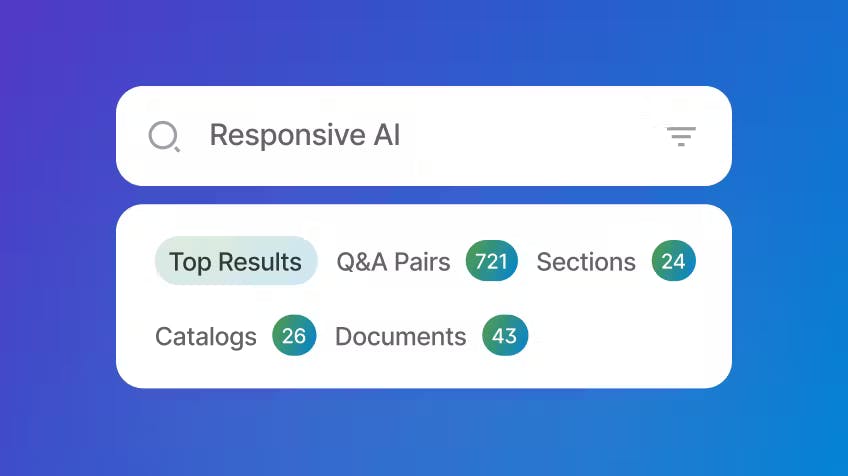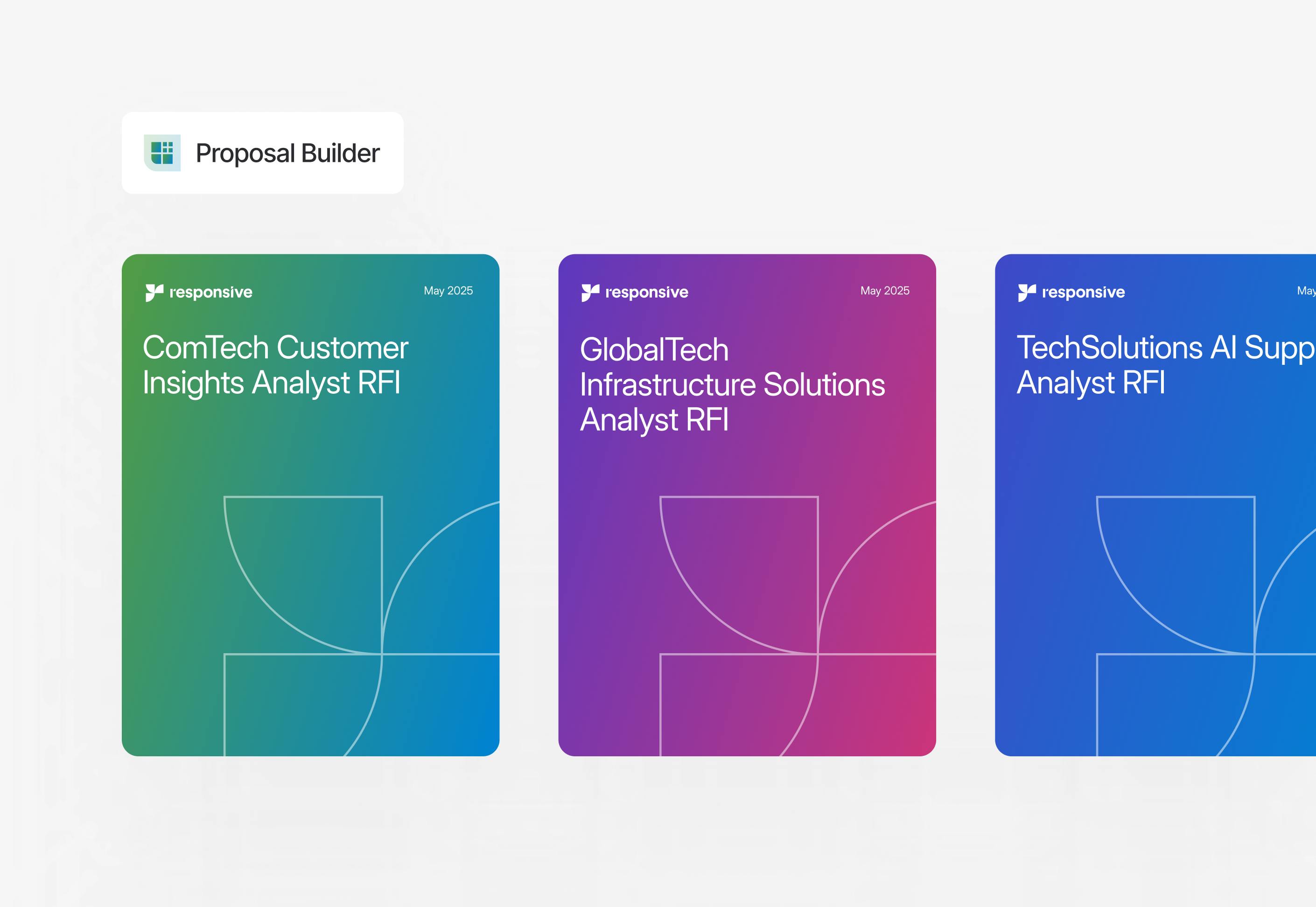As AI agents have seemingly proliferated every major software platform and software as a service (SaaS) in the past year, many people are still unsure about the benefits of this new and still largely misunderstood AI-based feature.
Naturally, the question in our industry has been asked whenever an AI agent pops up in discussions: Do you need an AI agent for RFPs?
Our answer? Yes. Simply put, every single modern RFP manager benefits from an AI agent.
If you manage RFP responses, you know the challenge that we’ve been highlighting for more than a year now, challenges we featured in the 2024 State of Strategic Response Management (SRM) Report that we sourced from hundreds of industry professionals. Those challenges include:
- An overwhelming volume of requests
- Increasingly tighter deadlines
- The need for high-quality, tailored responses
As businesses compete for contracts with shorter deadlines and ramping costs, efficiency and accuracy are non-negotiable. Thankfully, this is where AI agents come in to help.
In this blog, we’ll explore how AI agents are transforming the RFP process — helping teams streamline workflows, scale operations, and improve win rates. We’ll also break down the types of AI agents, their core technologies, and how Responsive employs them to revolutionize response management.
What is an AI agent?
An AI agent is a software-driven assistant designed to perform specific tasks, make decisions, and learn from interactions. These agents use advanced technologies such as natural language processing (NLP) and machine learning (ML) to process information, provide insights, and automate repetitive workflows. AI agents can be reactive, deliberative, or hybrid systems, operating independently or as part of a multi-agent network to tackle complex challenges.
Responsive AI agents aren’t just tools; they are trusted AI companions performing specialized mission-critical work to help teams work faster, smarter, and with greater accuracy.

Our approach to building Responsive AI agents is centered on seamless integration. They will operate wherever your teams work, whether that’s Slack, Ask, Teams, Word, Excel, or any of your other favorite platforms.
Each agent specializes in a key function critical to the pursuit lifecycle. Some of these agents will feel familiar to Responsive customers who have already leveraged Responsive AI for Strategic Response Management.
We’ll cover some of the specifics of what Responsive's agents can do later on in this blog.
When do RFP managers use AI agents?
AI agents are transforming how businesses respond to RFPs, making it easier to stay competitive. With AI-supported RFP software, organizations can automate tedious tasks, ensure consistency, and improve collaboration across teams.
Below are key scenarios where AI agents provide critical support:
To manage high RFP volume
- AI agents process vast amounts of information at speeds no human team could match.
- Routine tasks like data entry and template creation can be executed in seconds, allowing teams to focus on strategy and customization.
To scale with limited resources
- Many organizations face tight budgets and lean teams, a challenge that’s becoming both increasingly common and difficult to solve without AI assistance.
- AI agents reduce repetitive work for everyone, freeing up human expertise for more complex, high-value tasks.
To streamline workflows across teams
- RFPs require contributions from multiple stakeholders, most notably your invaluable subject matter experts (SMEs), often leading to disorganized workflows.
- As teams and organizations scale, systems often scale alongside them in a disorganized fashion, leading to both human error and time wasted searching for content.
- AI ensures seamless document transfers, automates approvals, and keeps everyone aligned on deadlines.
To improve communication between collaborators
- Large teams require structured communication channels to remain effective and efficient.
- AI agents act as intermediaries, answering common questions and sending timely reminders to keep projects moving.
To make quality more consistent for all deliverables
- Every RFP has unique requirements, and meeting them consistently is crucial, especially when it comes to winning new contracts.
- AI agents ensure adherence to brand guidelines, formal specifications on a per RFP basis, compliance standards, and proposal best practices.
Types of AI agents – and the tech that drives them
AI agents operate based on different methodologies, each suited for specific tasks. The most common types include:
- Reactive agents respond in real-time based on predefined rules (e.g., chatbots answering FAQs).
- Deliberative agents use planning and reasoning to make decisions (e.g., AI-assisted content generation tools).
- Hybrid agents combine reactive and deliberative approaches for more complex problem-solving (e.g., software used to control self-driving cars).
- Multi-agent systems work collaboratively with other AI agents to manage intricate processes (e.g., taxi dispatch, ride sharing, and traffic light control).
Responsive employs AI agents powered by NLP, ML, and automation with unparalleled intelligence to power bids, questionnaires, trust centers, and on-demand knowledge, infusing insight, accuracy, and speed into every response.
Our goal is simple: to help revenue teams focus on more winnable opportunities and execute growth strategies with confidence. As a result, teams will see an enhanced RFP process, ensuring greater speed, accuracy, and consistency.
How AI agents work

AI agents are used across industries in various ways, from customer service chatbots to virtual assistance to predictive inventory management. Their functionality relies on:
- Perception & data collection: Gathering inputs from documents, databases, and user interactions.
- Reasoning & decision-making: Processing the gathered information to determine the best, most accurate, and relevant course of action.
- Actuation: Executing tasks such as auto-filling RFP responses or suggesting improvements.
- Learning systems: Continuously improving performance based on past interactions and user feedback.
How do AI agents support the RFP process?
AI agents aren’t just tools — they’re strategic assets that enhance every stage of RFP response management. Some of these key benefits include:
- Streamlining workflows: Automating approvals, tracking deadlines, and managing content libraries.
- Enhancing accuracy: Reducing errors by auto-populating answers with vetted, approved content.
- Improving collaboration: Keeping SMEs and proposal managers aligned with task automation and communication reminders.
- Reducing workload: Taking over repetitive tasks so teams can focus on strategy.
- Accelerating turnaround: Producing polished drafts faster, reducing response times.
- Enabling scalability: Allowing teams to handle more RFPs without increasing headcount.
Responsive’s AI agents are effectively expanding on much of the work previously done hand-in-hand by proposal teams and Responsive AI when it came to using AI in bid and proposal writing.
AI agents on the Responsive platform
Responsive’s AI-powered platform leverages specialized agents to drive efficiency and improve win rates. In short, our specialized AI agents help inform, create, engage, optimize, and update, depending on the work and what you need done. Some key use cases include:
- Document shredder: Scans lengthy, complex documents in seconds, pulling out the most important information in a more digestible format.
- Proposal builder: Generates first-draft proposals by pulling from the Content Library.
- Go/No-Go facilitator - Helps determine if an RFP is a smart investment of your time based on whether or not you’re likely to win the deal.
- Content cleaner: Keeps your Content Library clean by keeping your relevant and accurate content easily findable while removing duplicates and out-of-date content.

As a result, Responsive’s specialized AI agents will help teams of all sizes accelerate growth, mitigate risk, and improve the overall experience for everyone involved.
With the newfound prevalence of AI agents across the industry and their immediate impact already being felt, Responsive is already accelerating innovation and plans to unveil new AI agents at breakneck speed, including the introduction of Agent Studio, a transformative tool that will allow users to create custom AI agents using natural language prompts.
Next steps: leveraging AI agents for RFP success
AI agents are no longer optional in the modern RFP landscape — they’re essential. If your organization is looking to streamline processes, improve response quality, and scale efficiently, AI-powered RFP solutions powered by the industry’s best AI agents should be your next investment.

